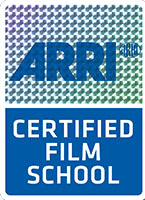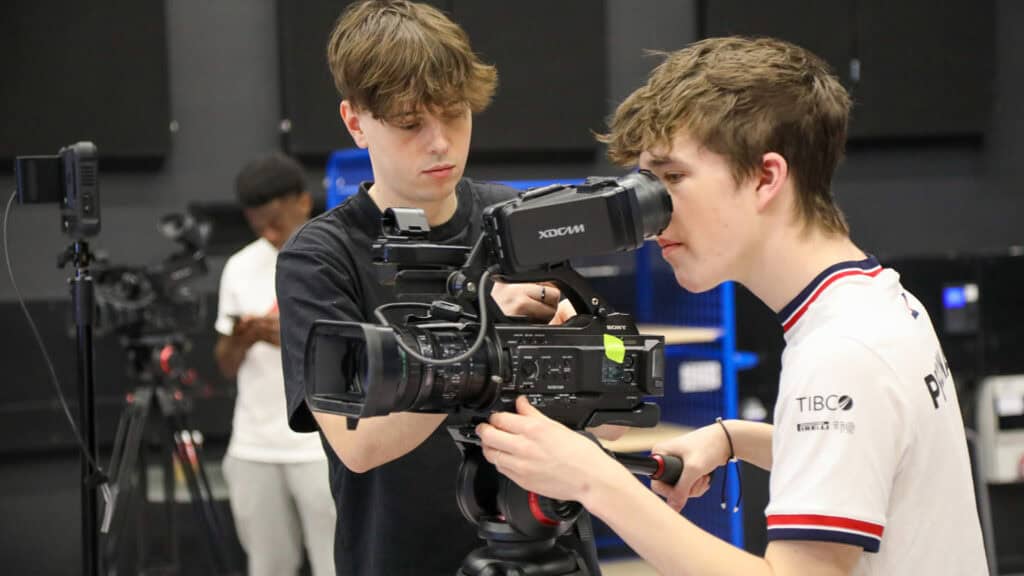91%
positivity for overall academic support
National Student Survey 2024
Top 20
in the UK for
Media and Film Studies
Guardian University Guide 2025
94%
positivity for facilities support learning
National Student Survey 2024
Join us at one of our Open Days!
Saturday 11 October
Sunday 26 October
Saturday 22 November
Saturday 11 October
Sunday 26 October
Saturday 22 November
Our next Open Day is in:
Overview
Learn the fundamentals of sports media coverage with a focus on esports
Our BA (Hons) Esports & Sports Media course offers hands on broadcast production and journalism experience with a key focus on the rapidly-growing esports industry.
Dive into the world of esports media
The course provides you with the fundamentals of media production within the esports sector, with a specific focus on the ever-expanding esports industry.
You will study esports team structures, branding and industry contexts alongside sports journalism, live event broadcasting and client directed production. We are also proudly sponsored by HyperX and DXRacer and more.
Gain technical production and journalism skills
You will develop a range of technical experiences and knowledge of events coverage practice, as you learn the key principles of camera and microphone operation.
You will also examine the nature of contemporary media, how it operates, how it differs from traditional journalism, and understand the way sports narratives are organised and structured.
Work with external clients
You will have the opportunity to gain experience working in client-led sports media production, as you understand more about self-promotion, networking, career portfolio management and ways to showcase your talents appropriately.
Study areas include:
- Casting
- Presenting
- Streaming
- Video editing
- Graphic creation
- Online event production.
On this course you will:
- Apply broadcast production and journalism practices to the world of esports.
- Develop your knowledge of technical production and equipment operation.
- Learn from industry professionals and experts.
- Engage in professional network-building opportunities to support your future career.
- Report on local sports, including University BUCS fixtures and your own esports events.
National Student Survey 2023
'Teaching on my course'
Learning opportunities
Overall average positivity
Partnerships
As a part of the Department of Creative Industries you will benefit from our industry partnerships with companies including HyperX, DXRacer, Twitch, ARRI and AVID, and be able to access industry standard software such as Nuke, Maya and Houdini.







The Course
Develop your knowledge of sports media production within esports
Year One
Your first year introduces you to the history of esports and the context of its development as a commercial industry over the past few decades. You will also begin to explore the specific considerations and expectations of media production within esports.
In addition, you will begin to understand the wider aspects of sports media production and contexts, as you gain your footing with equipment operation.
Year Two
In your second year, you will examine the nature of contemporary media, how it operates and how it differs from traditional journalism, as you begin to branch out to multi-camera events and develop your sports media production skills and practice.
Year Three
Your third year provides you with wider professional networking opportunities and industry skills in event production.
You will undertake a commissioned project with an external client and work with students from other courses to deliver a one-day live event covering a number of games and competitions.
Modules
Select a year
Sound and Vision
This module engages you in fundamental practice and principles of camera and microphone operation.
You will learn about:
- Camera setup and preparation
- Camera audio setup
- Connectivity and microphone preparation
- Eyepiece function and the graticule
- Tripod and safe practice
- Safe camera handling
- White balancing and exposure
- Basic picture composition and shot types
- Audio metering
- Monitoring and level adjustment
- Microphone placement
- Method and discipline of camera craft
- In-camera shot sequencing
- Basic coverage.
Assessments
You will be assessed through a short documentary film shot in a small team.
Sports Media: Video Journalism
This module helps you develop a range of professional, technical and procedural skills in video journalism.
Introduction to Journalism
This module develops your critical understanding of contemporary journalism, from hard news to niche interest writing.
You will explore: different writing styles (news reporting, reviewing, opinion pieces and more) across a range of different media outlets such as:
- Newspapers
- Review sites
- Magazines
- Investigate narrative structure
In addition, you will explore issues such as the shifting status of journalism and consider the legal and ethical issues around the subject.
Introduction to Sports Media
This module supports you as you transition into higher education. You will examine sport in various forms to consider the complex relationships between sport, media and society.
You will explore:
- Sports journalism
- Televised sport
- Sport and radio
- Sport in film
- Advertising
- Marketing
- Branding and sport
- Sport magazines
- Sport in other literature
- Sport and the digital landscape.
Introduction to Esports: History & Context
This module will introduce you to the history, development and current trends of the esports world. Esports is a rapidly growing industry, with global tournaments offering multi-million-pound prize funds and predicted growth of the sector set to explode into multiple billions in future years.
You will examine how competitive gaming competitions grew from Stanford University’s Spacewar competition in 1972 to the mass participation global events seen today.
The module will take a specific look into the history of esports, major tournaments, events and how they will feed into future events-based modules.
Media Productions for Esports: Marketing, Casting and Content
This module promotes a range of important skills which you will develop throughout your degree.
It offers a first taster into the world of media production within esports such as
- Casting
- Presenting
- Streaming
- Video editing
- Creating graphics.
Journalism and Content
This module will examine the nature of contemporary media, how it operates and how it differs from traditional journalism.
You will explore online information dissemination, the technologies involved, and how they may be manipulated.
You will explore the interview process as a journalistic tool and develop this as a transferable skill alongside design, online presentation, writing and understanding site traffic.
Multi-Camera Operations
This module explores the use of multi-camera recording techniques and the management of various events. It aims to provide you with a range of technical experiences and knowledge of events practice, while developing transferable skills in creating material to a client’s requirements.
Online Event Production
In this module, you will immerse yourself in the world of online event production and management across two semesters as you prepare for your final year live event.
You will explore the complexities behind running tournaments, such as:
- game selection
- single- or multi-player
- how many players/rounds
- and timings from start to finish.
Your events will probably start as small events for closed groups, and progress during the year to be more dynamic, professional and open.
Assessment
You will be assessed through a reflective commentary and a portfolio of work.
Sports Media Production One: Indoor Sport
This module covers a range of aspects of sports broadcasting.
You will develop appropriate industry skills in sports media production processes such as directing, camerawork, lighting, sound recording and production management. You will develop post-production skills in editing, graphics, visual effects and sound design as well as learning about reporting, researching, script supervision, anchoring, commentating and television production management as sport is transformed in the studio and across platforms.
Assessments
The assessment is a portfolio of work which includes a sportscast and a critical reflection on the production/post-production process, studio experience and specific practice.
Sports Media Production Two: Outdoor Sport
This module builds on knowledge gained in Sports Media Production One to develop your skill sets in sports media production and sportscasting.
Commissioned Project: External Client
In this module, you will have the opportunity to gain experience working in client-led sports media production.
You will gain a range of necessary skills including knowledge of self-promotion, networking, career portfolio management and ways to showcase talent appropriately.
Independent Project
This module enables you to plan and execute an individual project over two semesters.
It allows you to build on knowledge developed through the course as well as the opportunity to work on a research project independently to pursue specialist interests and enhance your knowledge of media-sport relations.
Live Event Production
On this module, you will work closely with BA (Hons) Sports Media cohorts, who will provide production and event filming support, to organise and deliver a one-day live event covering a number of games and competitions.
In addition, you will fully engage with events management, finding sponsorship, establishing branding and advertising the event.
Sports Broadcasting: Series Development and Commissioning
This practice-based module builds on your previous post-production experiences. You will develop advanced industry-standard skills in editing, sound design and the addition of music, graphics and other visual insertions to projects.
Teaching and Assessment
Feel the support of our expert and experienced staff
Teaching
You learn from experts in the fields of esports, creative technologies and live event production, through a variety of scheduled lectures, seminars, skills sessions, laboratory classes and practical workshops.
You will also be expected to undertake independent study and practical group work outside of the timetabled sessions. You will be expected to read journals, books and articles relating to your studies, many of which are available in the University library.
Smaller class sizes to help your development
Our commitment to smaller class sizes allows you to feel more confident to discuss your ideas in a supportive environment and allows your tutors get to know you and how best to aid your development.
Assessment
You will be assessed through a range of assignments including:
- Portfolios
- Essays
- Course work
- Practical work
- Presentations
- Reflective writing
- Continuous assessment.
Experience
Learn in our state-of-the-art Tech Park building
Discover our £35 million Tech Park
Our Bognor Regis campus boasts the £35m Tech Park and brings together science, technology, engineering, arts, and mathematics courses on one state-of-the-art site.
Expert staff
Our industry-experienced staff get to know you and your learning needs to help you thrive.
Learning Resource Centre
The Learning Resource Centre (LRC) contains the library, a café, IT/teaching rooms, and the Support and Information Zone (SIZ).
Library
Our campus library holds more than 200,000 books and over 500,000 eBooks.
Study Abroad
Explore the opportunity to study part of your course abroad
As a student at the University of Chichester, you can explore opportunities to study abroad during your studies to enrich your educational experience.
It’s a chance to broaden your horizons, a great opportunity to meet new people, undertake further travelling and to immerse yourself within a new culture.
You will be fully supported throughout the process to help find the right destination and institution for you and your course. We can take you through everything that you will need to consider, from visas to financial support, to ensure you get the best out of your time studying abroad.
Careers
Where you could go after your studies
Our BA (Hons) Esports and Sports Media course provides you with the skills and knowledge that can transfer to a wide range of industries and sectors, not just esports.
Potential career paths include:
- Social media
- Video graphics
- Journalism
- Marketing and advertising
- Television/film production.
Key stats about the esports industry
- The esports sector has grown at an annual average rate of 8.5% between 2016 and 2019.
- The esports sector in the UK earned an estimated £60m in revenue in 2019, just under 8% of the global market (£745m), which has translated into jobs growth.
- The sector supported over 1,200 jobs in 2019. The UK esports sector represents just under 8% of the global market. The UK esports sector supported £111.5 million in Gross Value Added (GVA) in 2019.
- The esports services industry includes companies and organisations in the UK that are engaged in the provision of esports tournaments, leagues and teams. It excludes streaming platforms and games publishers.
- The 18 leading companies and organisations comprising the UK’s esports services industry directly employed an estimated 328 FTEs in 2019, and generated direct GVA of £47m.
- Including indirect and induced economic impacts, the esports services industry generated a total of 915 FTEs of employment and £84.4m in GVA for the UK economy in 2019.
Postgraduate study options at the University of Chichester include:
- MA Screen Acting
- MA Composition for Film, TV and Games
- PGCE
- PhD Research
University of Chichester alumni who have completed a full undergraduate degree at the University will receive a 15% discount on their postgraduate fees.
Course Costs
Course Fees 2025/26
UK fee
International fee
EU/EEA Fee Reduction Scholarship
EU/EEA students automatically pay the equivalent of UK fees via the EU/EEA Fee Reduction Scholarship
For further details about fees, please see our Tuition Fee page.
For further details about international scholarships, please see our Scholarships page.
To find out about any additional costs on this course, please see our Additional Costs page.
Entry Requirements
Applying through Clearing
We know that you are so much more than your grades, which is why we take your aspirations, passion and personality into account. Through Clearing, we’re taking a flexible approach. Even if your grades are a little different from those advertised, please contact us – we’ll consider every application individually.
Typical offers (individual offers may vary):
UCAS
A Levels
BTEC/Cambridge Technical
Access to HE Diploma
IB
IELTS
If you are a mature applicant who does not have the standard entry requirements listed below, you will be asked to submit a ‘non-standard entry portfolio’ to demonstrate your readiness for higher education.
Contextual offers
We believe everyone deserves an equal opportunity to pursue higher education, regardless of their background.
When we receive your application we consider your personal circumstances and the factors surrounding your achievements to see if you are eligible for a contextual offer. This is an offer with a reduced entry tariff – typically the equivalent of 16 fewer UCAS points (two A-level grades).
Find out more about our contextual offers.





